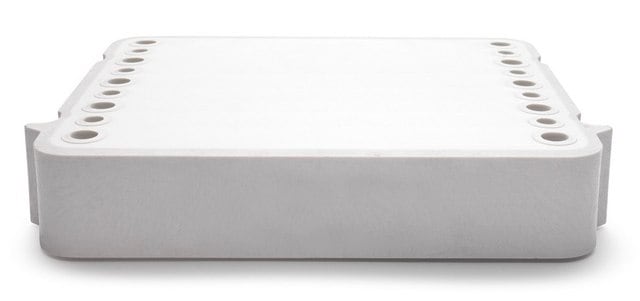Key Documents
Safety Information
P3C030C10
Pellicon® 3 Cassette with Ultracel® Membrane
filtration area 1.14 m2, NMWCO 30 kDa
Synonym(s):
Pellicon® 3 Cassette with Ultracel 30 kDa Membrane, C screen, 1.14 m2
About This Item
Recommended Products
material
TPE seal
composite regenerated cellulose (CRC)
polypropylene screen
stainless steel cap (for end; polypropylene-encapsulated)
Quality Level
feature
holdup volume 170 mL (in feed channel)
manufacturer/tradename
Pellicon®
parameter
30 psi max. reverse press. exposure at 25 °C (for 24 hours)
4-6 L/min-m2 recirculation rate
40 psi max. transmembrane pressure at 4-50 °C
6.9 bar max. inlet pressure (100 psi)
80 psi max. transmembrane pressure at 4-40 °C
technique(s)
analytical sample preparation: suitable
buffer exchange: suitable
protein purification: suitable (concentration)
H
3.8 cm (1.51 in.)
L
20.6 cm (8.1 in.)
W
17.8 cm (7 in.)
filtration area
1.14 m2
membrane area
1.14 m2
gravimetric extractables
≤1500 mg/m2
matrix
Ultracel® (Membrane)
pore size
30 kDa NMWCO
pH
2-13
Looking for similar products? Visit Product Comparison Guide
General description
The Pellicon® 3 Cassette with Ultracel® Membrane is designed for the filtration of therapeutic proteins (such as monoclonal antibodies) and recombinant and non-recombinant proteins.
This P3C030C10 Pellicon® 3 ultrafiltration device features a pore size of 30 kDa NMWCO, a filtration area of 1.14 m2, a PLCTK membrane, and dimensions measuring 2.4 cm (H) x 17.8 cm (W) x 20.6 cm (L).
Features and Benefits
- Rugged & reliable – ideally suited for today′s more demanding filtration processes
- High performance – produces excellent resolution, yields and back-pressure resistance
- Optimum product recovery – thanks to proven membrane technology
- Void-free technology – leading-edge membranes resolve virtually any separation challenge
- Defect-free, superior adhesion – Ultracel®uses composite membranes cast on a microporous substrate
- Automated manufacturing – delivers unbeatable performance, consistency and reliability
- Easy installation & care – simple to install and maintain
Other Notes
Analysis Note
Legal Information
Storage Class Code
10 - Combustible liquids
WGK
WGK 1
Regulatory Listings
Regulatory Listings are mainly provided for chemical products. Only limited information can be provided here for non-chemical products. No entry means none of the components are listed. It is the user’s obligation to ensure the safe and legal use of the product.
ISHL Indicated Name
Substances Subject to be Indicated Names
ISHL Notified Names
Substances Subject to be Notified Names
JAN Code
P3C030C10:
Certificates of Analysis (COA)
Search for Certificates of Analysis (COA) by entering the products Lot/Batch Number. Lot and Batch Numbers can be found on a product’s label following the words ‘Lot’ or ‘Batch’.
Already Own This Product?
Find documentation for the products that you have recently purchased in the Document Library.
Articles
Get practical guidance on using single-pass tangential flow filtration in your downstream process and scaling between capsules and cassettes.
Find best practices for using Pellicon® Capsules in ADC processing as well as data from two studies using Pellicon® Capsules and Pellicon® cassettes in the ADC manufacturing process.
This page provides an overview of USP <87>, <88>, and <1031>, compares bioreactivity testing, and describes the transition of our organization towards in vitro test methods.
Our team of scientists has experience in all areas of research including Life Science, Material Science, Chemical Synthesis, Chromatography, Analytical and many others.
Contact Technical Service

